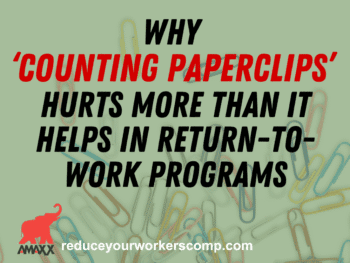Interested stakeholders in the workers’ compensation process are constantly seeking ways to reduce program costs.
One area includes the discontinuance of workers’ compensation benefits for school employees and teachers suffering from the effects of a work injury during the summer break period. While statues and case law interpretations vary in each jurisdiction, employers and insurers are generally limited in their ability to discontinue or suspend various workers’ compensation benefits for school employees during this time of year – even if they have no plans of looking for work while under restrictions on their activity.
Schools Out – Time to Discontinue Work Comp Benefits?
While the school year typically runs from late August through late May, employees of school districts around the country sustain work-related injuries every day. The ongoing effects of those work injuries do not magically disappear for summer break. Sadly, those hot summer days a teacher, paraprofessional or administrative staff employee would like to spend at a beach, can be spent at home convalescing. Proactive members of the claims management team might view this as an opportunity to discontinue ongoing wage loss and vocational rehabilitation benefits. Unfortunately, this is often not consistent with many state workers’ compensation laws via case law interpretation.
One case on point comes from Minnesota, where a school district sought to discontinue ongoing wage loss benefits at the conclusion of a school year.[1] The rationale for the discontinuance was based on the premise the employee did not intend to work during the summer months, and the result was no loss in wages. A compensation judge rejected this argument and affirmed by the Minnesota Workers’ Compensation Court of Appeals.
In affirming the reinstatement of wage loss benefits, the court noted that “A teacher who has no summer school duties is presumably free to pursue other part-time or short-term employment. Therefore, a teacher with a work injury might be entitled to continuing wage loss benefits through the summer if the teacher is totally unable to work for medical reasons attributable to the injury or has injury-related restrictions that affect is his or her ability to secure other employment.”
In sum, wage loss benefits are typically payable as long as the employee has a disability related to the work injury. The basis for this decision is also applicable to other forms of workers’ compensation benefits, including vocational rehabilitation.
Staying Proactive to Avoid the Summertime Claims Blues
Being away from work can cause the summertime blues in anyone – especially people who work in an educational environment. Now is the time for claims professionals handling claims related to school employees to be proactive on these matters to reduce their exposure and ensure improper discontinuance of benefits is not made.
- Investigate whether the school employee is engaged in seasonal employment. People who work in a school environment may be likely to work seasonal jobs during the summer months. This can include individuals suffering from work-related Efforts to investigate these matters may also include the use of surveillance if there is credible information the employee is working and not reporting their work activities.
- Make efforts to return the injured school employee to work. Proactive return to work efforts should be made on every claim. This is especially the case for school employees where wage loss benefits could be paid for an extended period of time. Suggestions include developing a “Work on Loan” relationship a local non-profit, volunteer agency, or other light duty work inside school district buildings and facilities.
- Monitor the status of claims involving school employees and stay in contact. Lack of communication between the employer/insurer and employee leads to conflict, fear and Staying in contact with the injured worker provides for effective communication and minimizes problems.
- Determine if the school employee is cooperating in vocational rehabilitation efforts. Summer break and time off from school does not give an injured school employee a vacation from their recovery and achieving their vocational rehabilitation goals. Various workers’ compensation benefits can still be discontinued or suspended for failure to cooperate with a rehabilitation plan.
Conclusions
School employment and summer breaks create an opportunity for interested stakeholders to stay engaged with employees and reduce workers’ compensation program costs. While most benefits typically remain payable during summer breaks, there are opportunities for motivated members of the claims management team to engage injured employees and minimize their exposure. This includes claim monitoring, engagement and ongoing efforts to return an employee back to work.
[1] Qualy v. Special School District No. 1, 1994 WL 421773 (MN WCCA).

Contact: mstack@reduceyourworkerscomp.com.
Workers’ Comp Roundup Blog: https://blog.reduceyourworkerscomp.com/
©2018 Amaxx LLC. All rights reserved under International Copyright Law.
Do not use this information without independent verification. All state laws vary. You should consult with your insurance broker, attorney, or qualified professional.




























